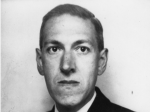
"Most daemoniacal of all shocks is that of the abysmally unexpected and grotesquely unbelievable," goes a typical line in the work of H.P. Lovecraft. "Nothing I had before undergone could compare in terror with what I now saw; with the bizarre marvels that sight implied." As a writer of what he called "weird fiction," Lovecraft specialized in the narrator plunged into a loss for words by the sheer incomprehensibility of that which he sees before him. But in the case of this particular sentence, the narrator sees not an ancient monster awakened from its millennia of slumber but "nothing less than the solid ground" — or as the reader put it, nothing more than the solid ground. But then, most of us haven't lived our entire lives locked up high in a castle.
The story is "The Outsider," something of an outlier in the Lovecraft canon due to its outsized popularity as well as its Gothic tinge. By the author's own admission, it owes a debt to his literary idol Edgar Allan Poe, and indeed represents Lovecraft's "literal though unconscious imitation of Poe at its very height."
In 1926 or today, one could do much worse for a model than Poe, and critics have also detected in "The Outsider" the possible influence of Nathaniel Hawthorne, Mary Shelley, and Oscar Wilde. Anyone daring to read the story aloud must thus strike a balance between several different competing tones, and few could hope to outdo Roddy McDowall's performance on the 1966 record above. But as Dangerous Minds' Paul Gallagher notes, that actor, "child star of Lassie Come Home and My Friend Flicka," is "hardly a name one would associate with the master of the unnameable."
Though McDowall would later "star in some jolly decent horror movies like The Legend of Hell House and Fright Night, he was in 1966 best known for the likes of "That Darn Cat! or Lord Love a Duck or the stage musical Camelot." In the event, McDowell proved "almost a perfect choice to give life to Lovecraft’s words," delivering a "light boyish charm" combined with an intonation that "causes a growing disquiet and a dreadful sense of unease," altogether suitable for the work of "the weird and reclusive Lovecraft." He also brings to the role the kind of faint, unexpectedly refined menace that would make him famous as Cornelius and Caesar in the Planet of the Apes films. After "The Outsider" McDowall reads Lovecaft's earlier story "The Hound," and surely his voice is just the one in which Lovecraft fans would want to hear spoken, for the very first time in Lovecraft's oeuvre, the name of the Necronomicon.
via Dangerous Minds
Related Content:
H.P. Lovecraft’s Classic Horror Stories Free Online: Download Audio Books, eBooks & More
An Animated Introduction to H.P. Lovecraft and How He Invented a New Gothic Horror
H.P. Lovecraft Gives Five Tips for Writing a Horror Story, or Any Piece of “Weird Fiction”
Making The Planet of the Apes: Roddy McDowall’s Home Movies and a 1966 Makeup Test
Based in Seoul, Colin Marshall writes and broadcasts on cities, language, and culture. His projects include the book The Stateless City: a Walk through 21st-Century Los Angeles and the video series The City in Cinema. Follow him on Twitter at @colinmarshall or on Facebook.
Hear H.P. Lovecraft Horror Stories Read by Roddy McDowall is a post from: Open Culture. Follow us on Facebook, Twitter, and Google Plus, or get our Daily Email. And don't miss our big collections of Free Online Courses, Free Online Movies, Free eBooks, Free Audio Books, Free Foreign Language Lessons, and MOOCs.
from Open Culture https://ift.tt/2IqOr1m
via Ilumina
Comments
Post a Comment